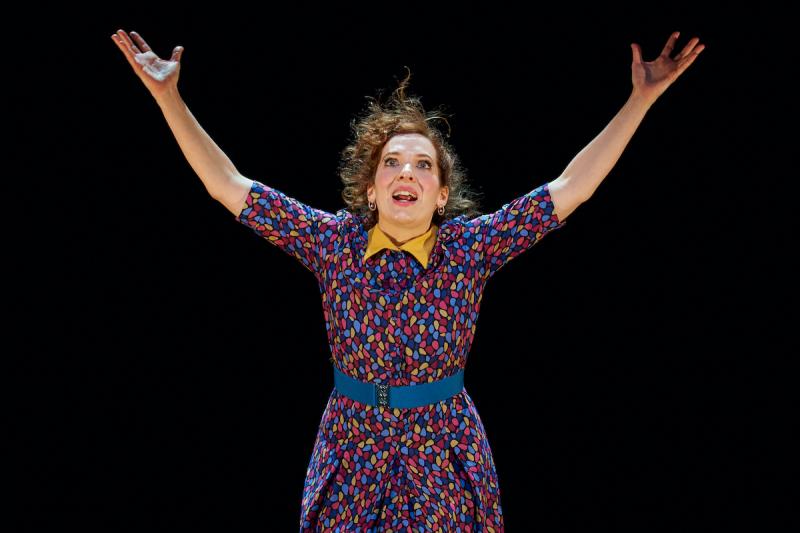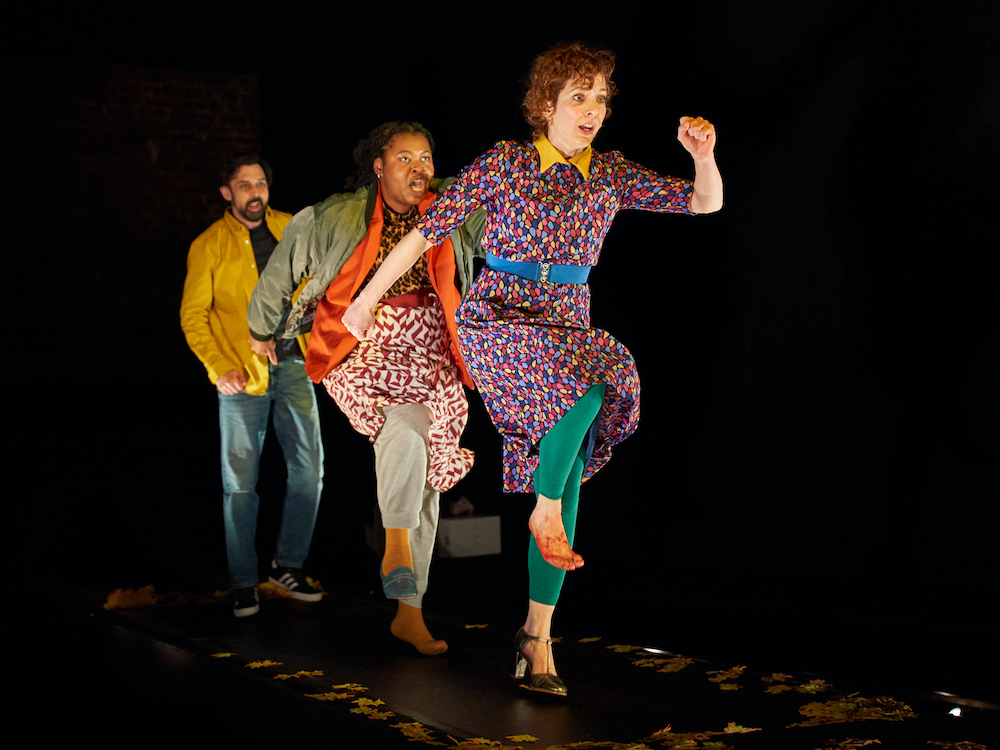Shoe Lady, Royal Court review - Katherine Parkinson is a footsore Beckettian | reviews, news & interviews
Shoe Lady, Royal Court review - Katherine Parkinson is a footsore Beckettian
Shoe Lady, Royal Court review - Katherine Parkinson is a footsore Beckettian
Slender new monologue about struggling middle-class womanhood

On my way to see this show, I see an urban fox. Before I can take a photo, it scrambles away. And I'm sure that, as it goes, it winks at me. This weird moment is a great prologue to EV Crowe's new play, virtually a monologue starring Katherine Parkinson, which is weird, and then some. And then some more.
The story, such as it is, starts with Viv, a typical middle-class woman who works as an estate agent in London, and lives with her husband Kenny and Child. She introduces us to her oh-so-familiar world: getting up, fixing breakfast, opening a dodgy curtain to reveal a sunny day, and doing the school run. On her way to work, on the tube, she loses her right shoe. The rest of the absurdist monologue explores her reaction to this incident, from reporting the loss to the police to stealing a new pair from a branch of Russell & Bromley. As she hobbles from one incident to another, meeting a homeless woman called Elaine on the way, she gets increasingly desperate.
This symbolic, Beckettian situation, involves typical middle-class angst, with a nice streak of intense exaggeration: what will my work colleagues think if I turn up with a bloodied foot? How long can I continue limping on one shoe? When is it okay to give up, and return home? The shoe symbolism is very effective because this affects the way you walk, the way you move. At one point, Viv puts on a pair of men's shoes and suddenly stands so much taller. Pity they are too big for her feet. Her bloodied foot is a symbol of fragility and her relations with every other woman she meets are mediated by footwear. Like a bizarre episode of Desperate Housewives, the image of a footsore woman evokes human anguish. By the end, Viv is spiralling into depression.
What starts as a comedy slowly shades into a nightmare. Viv's insistence that she is basically a good person is balanced by her declaration that it takes real guts to be a middle-class woman. In one farcical episode she has a fight with Elaine: when the chips are down, the suburban classes can be ruthless. Crowe's writing is spare and poetic, with repetitions and sudden psychological insights. The repeated image of a package that contains nothing suggests an existential bleakness, and the piece's talking curtain and chatty tree have a surreal power. It's not the most involving play in the world, but it does have an evocative resonance.
But although it's easy to see Crowe's point about how young professional women now have less material comforts and security than a generation ago, it does feel a bit rich to suggest that these economic insecurities have a symbolic value that elevates them to the level of existential discomfort. Of course, any individual can feel and experience bad times, bad thoughts and bad situations, but the exquisite subjectivity of this monologue should not blind us to its special pleading. If there are huge social injustices in Britain today, the condition of dissatisfied estate agents surely does not rank very high in the anger stakes. It's a bit like saying that playwrights are an oppressed minority. Or urban foxes.
Parkinson – a familiar face and voice from television's Humans and Defending the Guilty – is excellent. She travels from querulous alienation to a manic desperation with laughs quickly stifled by gulps of disquiet. Viv comes across as masochistic and increasingly lacking in self-esteem. Occasionally compelling, Featherstone's production, designed by Chloe Lamford, features a moving carousel and a foot that becomes ever-more bloody. There are lovingly still stage pictures and energetic moments of song and dance. Parkinson is well supported by Tom Kanji (Kenny/Curtain) and Kayla Meikle (Elaine) (pictured above with Parkinson) and the Child role is shared by Archer Brandon and Beatrice White (on press night, Brandon made his stage debut). Yet, however vivid, this is yet another rather slender play that would be better as one half of a double bill rather than as the main event.
rating
Explore topics
Share this article
Add comment
The future of Arts Journalism
You can stop theartsdesk.com closing!
We urgently need financing to survive. Our fundraising drive has thus far raised £49,000 but we need to reach £100,000 or we will be forced to close. Please contribute here: https://gofund.me/c3f6033d
And if you can forward this information to anyone who might assist, we’d be grateful.

Subscribe to theartsdesk.com
Thank you for continuing to read our work on theartsdesk.com. For unlimited access to every article in its entirety, including our archive of more than 15,000 pieces, we're asking for £5 per month or £40 per year. We feel it's a very good deal, and hope you do too.
To take a subscription now simply click here.
And if you're looking for that extra gift for a friend or family member, why not treat them to a theartsdesk.com gift subscription?
more Theatre
 The Line of Beauty, Almeida Theatre review - the 80s revisited in theatrically ravishing form
Alan Hollinghurst novel is cunningly filleted, very finely acted
The Line of Beauty, Almeida Theatre review - the 80s revisited in theatrically ravishing form
Alan Hollinghurst novel is cunningly filleted, very finely acted
 Wendy & Peter Pan, Barbican Theatre review - mixed bag of panto and comic play, turned up to 11
The RSC adaptation is aimed at children, though all will thrill to its spectacle
Wendy & Peter Pan, Barbican Theatre review - mixed bag of panto and comic play, turned up to 11
The RSC adaptation is aimed at children, though all will thrill to its spectacle
 Hedda, Orange Tree Theatre review - a monument reimagined, perhaps even improved
Scandinavian masterpiece transplanted into a London reeling from the ravages of war
Hedda, Orange Tree Theatre review - a monument reimagined, perhaps even improved
Scandinavian masterpiece transplanted into a London reeling from the ravages of war
 The Assembled Parties, Hampstead review - a rarity, a well-made play delivered straight
Witty but poignant tribute to the strength of family ties as all around disintegrates
The Assembled Parties, Hampstead review - a rarity, a well-made play delivered straight
Witty but poignant tribute to the strength of family ties as all around disintegrates
 Mary Page Marlowe, Old Vic review - a starry portrait of a splintered life
Tracy Letts's Off Broadway play makes a shimmeringly powerful London debut
Mary Page Marlowe, Old Vic review - a starry portrait of a splintered life
Tracy Letts's Off Broadway play makes a shimmeringly powerful London debut
 Little Brother, Soho Theatre review - light, bright but emotionally true
This Verity Bargate Award-winning dramedy is entertaining as well as thought provoking
Little Brother, Soho Theatre review - light, bright but emotionally true
This Verity Bargate Award-winning dramedy is entertaining as well as thought provoking
 The Unbelievers, Royal Court Theatre - grimly compelling, powerfully performed
Nick Payne's new play is amongst his best
The Unbelievers, Royal Court Theatre - grimly compelling, powerfully performed
Nick Payne's new play is amongst his best
 The Maids, Donmar Warehouse review - vibrant cast lost in a spectacular-looking fever dream
Kip Williams revises Genet, with little gained in the update except eye-popping visuals
The Maids, Donmar Warehouse review - vibrant cast lost in a spectacular-looking fever dream
Kip Williams revises Genet, with little gained in the update except eye-popping visuals
 Ragdoll, Jermyn Street Theatre review - compelling and emotionally truthful
Katherine Moar returns with a Patty Hearst-inspired follow up to her debut hit 'Farm Hall'
Ragdoll, Jermyn Street Theatre review - compelling and emotionally truthful
Katherine Moar returns with a Patty Hearst-inspired follow up to her debut hit 'Farm Hall'
 Troilus and Cressida, Globe Theatre review - a 'problem play' with added problems
Raucous and carnivalesque, but also ugly and incomprehensible
Troilus and Cressida, Globe Theatre review - a 'problem play' with added problems
Raucous and carnivalesque, but also ugly and incomprehensible
 Clarkston, Trafalgar Theatre review - two lads on a road to nowhere
Netflix star, Joe Locke, is the selling point of a production that needs one
Clarkston, Trafalgar Theatre review - two lads on a road to nowhere
Netflix star, Joe Locke, is the selling point of a production that needs one
 Ghost Stories, Peacock Theatre review - spirited staging but short on scares
Impressive spectacle saves an ageing show in an unsuitable venue
Ghost Stories, Peacock Theatre review - spirited staging but short on scares
Impressive spectacle saves an ageing show in an unsuitable venue

Comments
I really wanted to like this